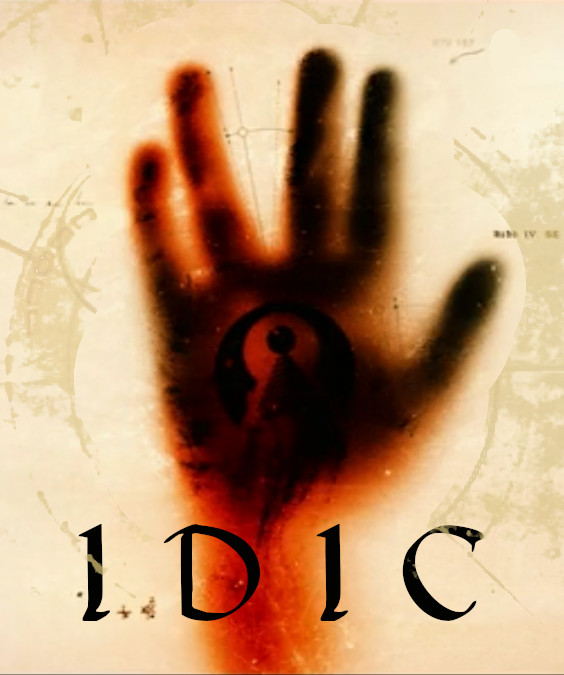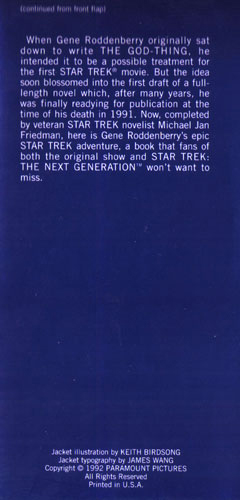
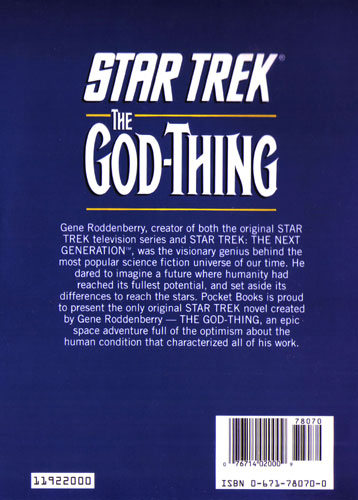

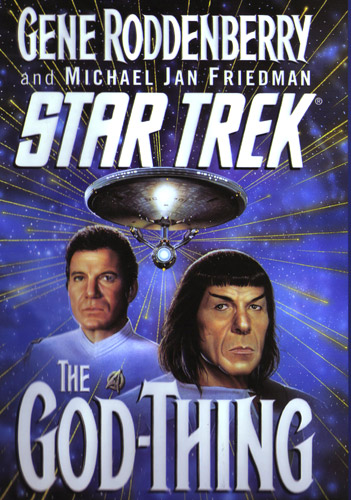
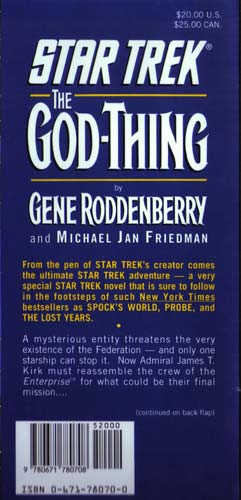
The God-Thing: Gene Roddenberry's Lost Star Trek Novel
Created 1997 | Last updated January 27, 2010 | Steve Roby
Introduction
This is the story of Gene Roddenberry's lost Star Trek novel. More than thirty years ago, Star Trek creator Roddenberry wrote
a screenplay that he hoped would be the basis for the first Star Trek motion
picture. Paramount rejected it. Believing he had a story worth telling, Roddenberry decided to use
it as the basis of his first Star Trek novel. He called it The God-Thing. It would be published by Bantam in 1977. But that didn't happen, and it
disappeared into limbo for years. Then Pocket announced it would be published in 1992. Or in 1993,
expanded by Michael Jan Friedman. Again, it didn't happen. Roddenberry's official biographer David
Alexander announced in 1993 that he, not Friedman, was rewriting and expanding Roddenberry's
manuscript. And again nothing happened.
Although I'm not a great fan of Gene Roddenberry's writing, I've been waiting a long time
for The God-Thing. Maybe it's because I was only 13 when I first heard about it,
in an era when new Star Trek material was all too rare. Or maybe it's because
I'm curious about the roads not taken. Although some elements of The God-Thing
were reworked and included in Star Trek: The Motion Picture, there was,
apparently, much that was different, and I can only wonder how the last thirty years
of Star Trek might have developed if The God-Thing had been
used as the basis for the first movie, or if the Phase II series had been made.
Whether anything could live up to so long and frustrating a wait is a question that may well go
unanswered.
More than a decade ago, frustrated by a twenty-year wait, I went through a number of old
magazines and books to see how much information I had about The God-Thing. I
also had some notes from a discussion with Friedman at Toronto Trek. I pulled the material together
and created the first version of this page in 1997. I've been adding new material to it as I come
across it ever since. The main thing that seems to have changed, though, is that publication
of The God-Thing seems a lot more remote in 2008 than it did in 1997, a mere two
years after the last time the book was scheduled to be published.
2010 update: a collector who bought a copy of the
Koenig-revised manuscript through eBay contacted me recently to provide
some more information. See below.
1976
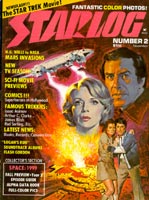 Starlog #2, November 1976
Starlog #2, November 1976
The Star Trek Movie by Jim Burns
A few months before the title The God-Thing was first used, a Starlog
article provided a quote from Gene Roddenberry describing the rejected
screenplay on which the novel was based. David Alexander mentioned this
quote in his 1994 Roddenberry biography (see below).
"The first script," Roddenberry recently explained, "was
a story that dealt with the meaning of God. What I think bothered
Paramount was that I had a little sequence on Vulcan in which the Vulcan
masters, the people Spock studied under, were saying: 'We have never
really understood your Earth legends of gods. Particularly in that so
many of your gods have said, "You have to bow down on your bellies every
seven days and worship me." This seems to us like they are very
insecure gods.'" [p.13]
1977
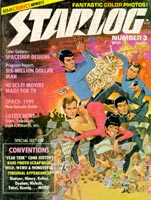 Starlog #3, January, 1977
Starlog #3, January, 1977
The New Roddenberry Star Trek Novel
Gene Roddenberry is presently adapting his first script written for the Star Trek
film (which was rejected by Paramount), into a novel for Bantam Books.
When asked what the novel will deal with, Roddenberry answered:
"Generally, the situation is that the five year mission is over
and that it has been for some time. Most of the regular crew have been
promoted and, for the most part, are pretty unhappy with shuffling
papers and other administrative jobs. Scotty has become an alcoholic,
and McCoy has given up treating human patients to become a veterinarian,
loudly proclaiming animals as the only sensible patients he has ever
had. It gives us kind of a fun look at these people's strengths and
weaknesses. In the story, there is a story that brings them all together
again."
Gene said that the main thrust of the story deals with the
meaning of God and whether or not God is much more and further beyond
merely some entity that visited the Garden of Eden. Though confident of
publication in the near future, Roddenberry wasn't exactly sure when he
would complete the book. [p.60]
In retrospect, that last line strikes me as somewhat ironic.
Starlog #7, August, 1977
Star Trek Report by Susan Sackett
"And, as if all these projects weren't enough, Gene is now
completing his novelization of the original movie script (the one
Paramount rejected) tentatively titled "The God Thing." It's due to be published by Bantam Books late this year." [p. 31]
1978
Starlog #12, March, 1978
The Making of Star Trek II - A Conversation With Gene Roddenberry
"The novelization of the first movie script is half done. Bantam
has said to me, 'It's more important to us that you go ahead and put
full energy on the new Star Trek television series, and we'll be
glad to wait until you have a chance to finish up the novel,' so I'm
holding it off until I get some free time. I have a first draft of it
that I've rewritten, and I have to rewrite the other half." [p. 29]
Starlog #16, September, 1978
Star Trek Report by Susan Sackett
"The book The God Thing is to be based on Gene Roddenberry's original script for the Star Trek
movie which was written back in 1975. Bantam Books has given him an
extension in completing this because of the production of the film,
which is a full-time effort."
1980
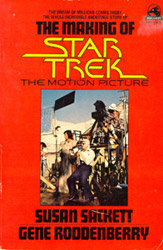 The Making of Star Trek-The Motion Picture, by Susan Sackett and Gene Roddenberry, Pocket/Wallaby, 1980
The Making of Star Trek-The Motion Picture, by Susan Sackett and Gene Roddenberry, Pocket/Wallaby, 1980
More than just a making-of-the-movie book, The Making of Star Trek-The Motion Picture
has a few interesting chapters on what happened between the
cancellation of the original series in 1969 and the filming of the movie
a decade later, including some information on the story of The God Thing as proposed movie script.
Though it's credited to both Susan Sackett and Gene Roddenberry,
Sackett was the actual writer of the book. Her more recent book Inside Trek (see below) tells more about the story behind the story.
Chapter 3
Sub-Warp Speed
It seemed simple enough. With a $3 to $5 million budget allocated, Gene Roddenberry could write the kind of Star Trek
script he has always wanted to do. He arrived on the Paramount lot in
May of 1975, ordered up a stack of fresh white typing paper from studio
supplies and began to write Star Trek II. By June 30 he had turned out what he felt was a good first draft of the script. The studio executives disagreed.
The story begins with Spock on Vulcan, emaciated, bedraggled,
meditating with the Vulcan Masters. His thoughts are disrupted by
something about to happen to Earth and his old friend Jim Kirk. He has
not become truly Vulcan. Pai-ad, one of the nine Masters, speaks with
him:
PAI-AD
Did you think to cast out the human within yourself? You have not.
SPOCK
Then, I am nothing, Pai-ad. I cannot exist in two halves.
PAI-AD
Your halves are needed, Spock. Move your thoughts with me to Earth.
The story then moves directly from Vulcan to Earth orbit and the drydocks over the San Francisco Naval Yards, where the Enterprise
is being refitted. On the planet below, people are beginning to receive
mental impressions of a returning God. At the same time a huge Object,
one thousand times larger than a starship, is moving toward Earth,
knocking off the U.S.S. Potemkin and hurtling a cluster of
asteroids toward Earth. Kirk, now a grounded admiral, assembles his old
crew (all of whom have risen higher in rank), and they take the newly
refitted Enterprise on a mission of interception with the alien
claiming to be God. The Object turns out to be more than just a
vessel--it is a computer form so advanced it is a living entity itself.
However, we discover that this God they've worshipped is actually the
Deceiver, the computer-programmed remains of a race who were "cast out"
from their dimension and into this one. At the end, Kirk wins out, the
entity returns to its other dimension, and the Enterprise crew is left
with a gift-- they return to Earth and discover that the "deceiver-God"
entity had made them a gift of time in which they are suddenly younger
and are now returning from their first five-year mission. Interestingly
enough, many of these same story elements ended up in the ST-TMP script three years later.
Gene had been iconoclastically asking what if the God of the Old
Testament, full of tirades and demands to be worshipped, actually turned
out to be Lucifer. If so, was the serpent's offer of the Fruit of
Knowledge actually a gift from the real God? Captain Kirk versus God.
This was not the story Paramount had expected! The movie was postponed
from fall 1975 until the following spring so that a new script could be
found. [p. 23-24]
1991
On November 10, 1991, Alan Ravitch posted a list of upcoming Trek books on CompuServe, based on information provided by Robert Greenberger. The God Thing was scheduled for July, 1992 hardcover release. Ravitch pointed out that Roddenberry's recent death might affect publication.
1992
 Trek: The Lost Years, by Edward Gross, Pioneer, 1988
Trek: The Lost Years, by Edward Gross, Pioneer, 1988
Lost Voyages of Trek and the Next Generation, by Bill Planer, Cinemaker Press, 1992
The material in this section has seen print in two or three
formats. Most of the material is in both of the above books, word for
word, and the last few paragraphs appear only in the first, but the
reference to a forthcoming edition of the novel appears only in the
second. Ed Gross wrote for Cinemaker after writing for Hal Schuster's
Pioneer imprint, so "Bill Planer" is not a plagiarist but a pseudonym.
The Pioneer book appears to be a second edition. The first was published
by Hal Schuster's previous company, Schuster & Schuster.
The first attempt at reviving Star Trek came with Gene Roddenberry's 1975 script for The God Thing.
"They turned me down a couple of times," said Roddenberry
regarding a film version of the series, "then they finally said, 'Write a
script and we'll give you an office on the lot and think about it.'
They were not that serious about [it] when we first started. I think
they had in mind a $2-$3 million picture."
[William Shatner, working on the series Barbary Coast, finds GR typing away in an office, working on the script.]
"So I said, 'There's gonna be a movie? What's it gonna be
about?' He said, 'First of all, we have to explain how you guys got
older. So what we have to do is move everybody up a rank. You become an
Admiral, and the rest of the cast become Starfleet Commanders. One day a
force comes toward Earth--might be God, might be the Devil--breaking
everything in its path, except the minds of the starship commanders. So
we gotta find all the original crewmen for the starship Enterprise,
but first--where is Spock? He's back on Vulcan doing R&R five year
mission--seven years of R&R. He swam back upstream. So we gotta go
get him.' I call that show, 'What Makes Salmon Run?' So we get Spock, do
battle and it was a great story, but the studio turned it down."
Although little is known about the resulting script, reports have
stated that the premise questioned the very nature of God and the
universe around us. Paramount was apparently not interested in a script
which, essentially, pit Captain Kirk against God.
Director Richard Colla, who had helmed Roddenberry's The Questor Tapes, was very familiar with that particular screenplay and recalls it fondly.
"That script was much more daring," he reflects. "They went off
in search of that thing from outer space that was affecting everything.
By the time they got to the spaceship and got into its [the alien's]
presence, it manifested itself and said, 'Do you know me?' Kirk said,
'No, I don't know who you are.' It said, 'Strange, how could you not
know who I am?' So it shift-changed and became another image and said,
'Do you know me?' Kirk said, 'No, who are you?' It replied, 'The time
has passed and you should know me by now.' It shifts shape again and
comes up in the form of Christ the Carpenter, and says, 'Do you know
me?' and Kirk said, 'Oh, now I know who you are.' And he says, 'How
strange you didn't know these other forms of me.' Really, what Gene had
written was that this 'thing' was sent forth to lay down the law; to
communicate the law of the universe, and that as time goes on the law
needs to be reinterpreted. And at that time 2,000 years ago, the law was
interpreted by this Carpenter image. As time went on, the law was meant
to be reinterpreted, and the Christ figure was meant to reappear in
different forms. But this machine malfunctioned, and it was like a
phonograph record that got caught in a groove and kept grooving back,
grooving back, grooving back. It's important to understand the essence
of all this and reinterpret it as time goes on. This was a little heavy
for Paramount. It was meant to be strong and moving, and I'm sorry it
never got made."
"I handed them a script and they turned it down," Roddenberry
stated. "It was too controversial. It talked about concepts like, 'Who
is God?' [In it] the Enterprise meets God in space; God is a
life form, and I wanted to suggest that there may have been, at one time
in the human beginning, an alien entity that early man believed was
God, and kept those legends. But I also wanted to suggest that it might
have been as much the Devil as it was God. After all, what kind of god
would throw humans out of Paradise for eating the fruit of the Tree of
Knowledge. One of the Vulcans on board, in a very logical way, says, 'If
this is your God, he's not very impressive. He's got so many
psychological problems; he's so insecure. He demands worship every seven
days. He goes out and creates faulty humans and then blames them for
his own mistakes. He's a pretty poor excuse for a supreme being.' Not
surprisingly, that didn't sent [sic] the Paramount executives off crying
with glee. But I think good science fiction, historically, has been
used that way--to question everything."
Back in the '70s, Roddenberry claimed that he was adapting this
screenplay into novel form. It will finally see print in the fall of
1992 as a special hardcover edition from Pocket Books. [Gross pp.23-25,
Planer p.9-10]
...
Jon Povill, who would eventually go on to be story editor of the proposed Star Trek
II television series and associate producer of the first film, had
worked with Gene Roddenberry on what was then planned to be a
novelization of "The God Thing."
"Gene went to work on that script in May of 1975," details Povill, and it was his first attempt at a Star Trek feature. By August it was discarded by [Paramount President] Barry Diller...." [Gross p.26]
The Man Who Created Star Trek: Gene Roddenberry, by James Van Hise, Pioneer Books, 1992
"It was felt by some higher ups that my script might offend
religious people," Gene recounted. "Perhaps it had just offended them. I
had had the script read by a couple of Jesuit priest friends, a rabbi
and a number of others, and they were not offended." [p.74]
Personal notes, from Michael Jan Friedman's reading at Toronto Trek, 1992
Due to a conference scheduling mix-up, almost nobody showed up for
the reading, so I was able to ask Friedman a few questions. His work on The God Thing
was obviously on my mind, so I asked him about it. (No, he didn't do a
reading from it.) From my notes scribbled shortly thereafter:
GR's manuscript was very lean, about half the length of a novel,
almost more like a screenplay. There were also continuity problems,
suggesting he was making it up as he went along. MJF is padding it out
and straightening out the internal consistency of the novel, but, I was
glad to hear, he is not "fixing" it so it will fit into the
movie-enhanced Star Trek universe. Although there are some plot elements similar to Star Trek - The Motion Picture,
GR's characterization was extremely different. Spock and Sulu are
apparently a lot different from the characters as we now know them, and
the others have changed to a lesser extent. It's going to be marketed as
a what if, alternate universe kind of story. It's also taking a very
long time. It probably will be out in August of next year, rather than
this fall, as previously scheduled. The problem is not so much Paramount
Licensing as the estate of Gene Roddenberry, which has a completely
different set of concerns. And their main priority is litigation
concerning GR's estate. It's not certain whether the book will be
credited to GR with MJF or vice versa; the estate apparently has reasons
for doing it either way.
(See below for Friedman's 2003 comments.)
1993
In the fall of 1993, Locus, the pre-eminent news magazine of
the science fiction world, noted that David Alexander, Roddenberry's
official biographer, had sold an expansion of The God Thing to
Pocket. On CompuServe, I asked Pocket Books editor John Ordover for
confirmation, and he said that Pocket had not yet seen Alexander's
manuscript, though he understood that Friedman's material would not be
included.
1994
Gene Roddenberry: The Myth and the Man Behind Star Trek by Joel Engel, Hyperion, 1994
In May 1975, Gene Roddenberry accepted an offer from Paramount to develop Star Trek
into a feature film, and moved back into his old office on the
Paramount lot. His proposed story told of a flying saucer, hovering
above Earth, that was programmed to send down people who looked like
prophets, including Jesus Christ. Who or what had programmed the craft
was not addressed. 'Basically,' Jon Povill says, 'God was a
malfunctioning spaceship.' By July, Paramount had rejected the
treatment. Roddenberry blamed the religious backgrounds of Paramount
executives, including Barry Diller, a practicing Catholic, for the
rejection of his story. [p.165]
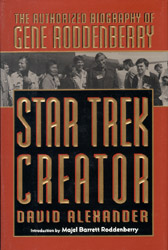 Star Trek Creator by David Alexander, Roc, 1994
Star Trek Creator by David Alexander, Roc, 1994
In early November 1976, Starlog reported that the feature
originally set to begin filming July 15 was not ready to begin
production because there was no script. Part of a Roddenberry story that
had been submitted to and rejected by Paramount was quoted. The
reporter characterized the story as dealing with the meaning of God and
wrote that "Roddenberry thinks Paramount executives were bothered by a
'little sequence on Vulcan in which the Vulcan masters, the people Spock
studied under, were saying 'We have never really understood your Earth
legends of gods. Particularly in that so many of your gods have said,
"You have to bow down on your bellies every seven days and worship me."
This seems to us like they are very insecure gods.'"" [Alexander's
footnote: Presumably this came from The God Thing, a novelette by
Gene, submitted to Paramount as the story for the first film. Paramount
rejected Gene's effort as too anti-religious, yet this writer can find
no such line by Vulcans in his copy of the manuscript.] [p.431]
Alexander is quoting an article by Jim Burns from Starlog 2 (see above).
In the summer of 1994 I emailed David Alexander about the book. He replied on July 27, saying that he didn't yet know when The God Thing
would be published. (Around that time Alexander was embroiled in a
flamewar on CompuServe involving another CompuServe user mentioned in
Alexander's Roddenberry biography, and eventually Alexander dropped off
the service. In 2008, having finally found a new email address for
Alexander, I asked him about The God Thing, but he declined to comment.)
Star Trek Movie Memories by William Shatner with Chris Kreski, HarperCollins, 1994
"Somewhere out there," [Gene] starts off, his eyes widening as he
continues, "there's this massive ... entity, this abstract, unknown
life force that seems mechanical in nature, although it actually
possesses its own highly advanced consciousness. It's a force thousands
of times greater than anything intergalactic civilization has ever
witnessed. It could be God, it could be Satan, and it's heading toward
earth. It demands worship and assistance, and it's also in a highly
volatile state of disrepair."
He goes on to tell me that the original crew of the Enterprise
are now being embraced as heroes all over the galaxy. Spock has gone
back to Vulcan to become head of their Science Academy. McCoy's married
and living on a farm in the Midwest (although his wife, following in the
time-honored tradition of women dumb enough to fall for an Enterprise
crewman, is promptly killed off.) Everyone else has been given hefty
promotions, and continues to serve on active duty. Additionally,
Starfleet has offered Kirk a prestigious but deskbound admiralcy, but
he's passed, preferring to retain his rank as captain while acting as a
sort of consultant/ troubleshooter aboard Federation spacecraft. As we
find him, he's visiting the recently overhauled Enterprise, supervising her new captain, Pavel Chekov.
Throughout the bulk of the next two hours Kirk rounds up the old
crew, while studying and ultimately battling this "God thing." As the
drama builds and we finally approach the craft, the alien presence
manifests itself on board the Enterprise in the form of a
humanoid probe, which quickly begins shape-shifting while preaching
about having traveled to earth many times, always in a noble effort to
lay down the law of the cosmos. Its final image is that of Jesus Christ.
"You must help me!" the probe repeats, now bleeding from hands,
feet and forehead. Kirk refuses, at which point the probe begins
exhausting the last of its energy in a last-ditch violent rampage,
commanding the Enterprise crew to provide the assistance it needs in order to survive.
Without warning, the force summons up the last of its remaining
strength to blast Sulu, severing the crewman's legs in the process. When
Spock attempts to comfort the mortally wounded Sulu he, too, is blasted
and left for dead. With that expenditure of energy, the vessel is
weakened to the point of vulnerability, and the Enterprise unleashes a
barrage of firepower that destroys the craft.
"With that," says Gene, "we begin pondering the notion that
perhaps mankind has finally evolved to the point where it's outgrown its
need for gods, competent to account for its own behavior without the
religiously imposed concepts of fear, guilt or divine intervention." [p.
37-38]
1995
Locus #410, March 1995
In the magazine's quarterly list of Forthcoming Books, p.44, Pocket lists Star Trek: The God Thing by Gene Roddenberry as a planned November, 1995 hardcover release. It didn't happen.
1996
Ask John Ordover (Pocket Star Trek books website), September 22, 1996
In response to a fan's question about the status of the book, Pocket Books Editor John Ordover stated, "The God Thing has gotten tied up in the legal wrangling over Roddenberry's estate. It won't be happening any time soon."
1998
Warped Factors: A Neurotic's Guide to the Universe by Walter Koenig, Taylor Publishing, 1998
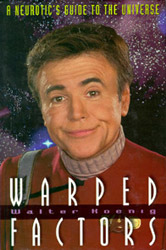 Koenig writes that he was Roddenberry's first writing partner on the project:
Koenig writes that he was Roddenberry's first writing partner on the project:
I was working on another novel in 1976 and I was paying Susan
Sackett, Roddenberry's executive secretary, to do a professional typing
job on it. (To this day I can't spell.) She showed it to Gene, who then
asked me to collaborate on a novel he was writing. He was calling it Star Trek II.
It was, in part, a story about an entity that believed itself to be
God. Roddenberry had previously submitted it as a screenplay to Barry
Diller, the Paramount Pictures chairman, as the basis for a feature
film. Diller didn't like the religious overtones and declined to go
forward with it.
Gene had been writing on it for a month and had sixty-eight pages
done when he handed it over to me. I did another eighty-three pages in
the two months that followed and handed in the finished manuscript in
December. His initial reaction was very enthusiastic. He was delighted
with what I had done and although it was more like a novella than a
novel he was looking forward to its publication.
A few weeks went by and Susan called to say that he was
abandoning the project. I assumed that he had re-evaluated my work,
found it wanting, and decided not to have it published after all. I've
only recently learned that my efforts were not a mitigating factor. It
all had to do with Gene's relationship with Paramount Pictures and the
fact that a deal to produce a new Star Trek TV series rendered publishing the book superfluous.
I still have the material. It's not a bad story. Anyone listening? [p. 217]
2002
Inside Trek: My Secret Life With Star Trek Creator Gene Roddenberry by Susan Sackett, Hawk Publishing, 2002
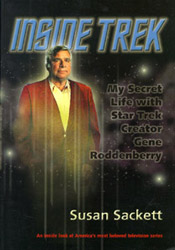 As
Gene Roddenberry's personal assistant (and, she reveals in this memoir,
lover), Susan Sackett had an inside look at developments in Star Trek
from the mid-1970s to 1991. She wrote or co-wrote a few books and
episodes. This book (consisting of material first made available on her
website through paid subscriptions back in 2000) has some material on The God Thing.
As
Gene Roddenberry's personal assistant (and, she reveals in this memoir,
lover), Susan Sackett had an inside look at developments in Star Trek
from the mid-1970s to 1991. She wrote or co-wrote a few books and
episodes. This book (consisting of material first made available on her
website through paid subscriptions back in 2000) has some material on The God Thing.
In his script and partially completed novelization of The God Thing,
there was a scene in which several female sirens tantalized Captain
Kirk while they engaged in a weightless free-for-all, rolling in oil,
their bodies glistening in what began as a sensual gymnastic event for
Kirk and turned into a deadly contest for his life. [p.67]
[Gene Roddenberry's] spiritual beliefs were extant, although they
were revised frequently. When I first discussed this with him, he
believed in what he called the "All," the life force of the universe.
Occasionally he referred to this concept as "God," although it was clear
that his was not the Judeo-Christian god concept in any shape or form.
It was this fascination with religion that had formed the basis
of Gene's rejected sequel script for Paramount. In that story, Captain
Kirk and company encounter a seemingly omnipotent being who claims to be
the God of the Old Testament. After a few parlor tricks, such as
restoring Lt. Sulu's amputated legs, many of the crew begin to believe
that this being may indeed be a deity. In actuality, it is a powerful
machine with confused programming (a favorite plot device Gene would use
many times), arriving at Earth thinking it is a messiah. Only Kirk
remains steadfast in his disbelief.
The script contained elements which would eventually be incorporated years later into the story for Star Trek: The Motion Picture
-- things like Spock spending time as a novitiate with the Vulcan
Masters; a transporter accident in which people beam up with scrambled
body parts; a disgruntled McCoy beaming aboard after finding happiness
in a back-to-nature existence, and a visit to Starfleet Headquarters in
San Francisco. In the end, Kirk inevitable goes one-on-one with the
Entity, whose Christlike image dissolves into patterns resembling "The
Great Deceiver," as Gene put it.
Following the studio's rejection of this script, Gene began writing it as a novel, calling it The God Thing. It was set aside when other projects demanded his attention, and the book was incomplete at the time of his death. [p.68-69]
From a chapter covering early 1991:
During my research for the anniversary book, I had dusted off Gene's partially completed manuscript for The God Thing,
the novelization of his rejected movie script. I remembered how much
work Gene had put into it, and asked him if he would allow me to bring
it to the attention of David Stern, our editor at Pocket Books. Although
it was originally contracted with Bantam, nearly fourteen years had
passed since that time and perhaps a new publisher would be interested.
At first, Gene wasn't wild about this new idea.
[...]
... I shipped the rough copy off to New York. David Stern seemed
quite taken with the manuscript, agreeing, however, that it needed
expanding and updating. Would Fred Bronson and I (by now our names were
interlinked as a team) be interested in completing this project for
Gene? I gave Gene the good news, and he was enthusiastic about giving us
the opportunity to do this for him. "You certainly know my style better
than anyone," he admitted.
Everyone was enthusiastic about the potential of this book. That
spring I had my assistant, Jana, prepare a retyping of the manuscript,
since it had last been worked on in 1977 by Gene's secretary in England
while shooting Spectre. The type was barely legible and it needed
to be put on computer disk. As she progressed, I began working on
pages, changing typos, editing awkward sentences, finding areas I wanted
to expand. David, too, began making a series of notes and was eager for
our deal to be formalized so that work could begin in earnest.
The delay in getting our contracts for this book seemed endless.
Negotiations had begun in April, 1991; in July, Fred and I met with Gene
and [Roddenberry lawyer Leonard] Maizlish to discuss how much money
would be involved and how the cover credits would appear. We had a
verbal agreement for months, but still no contract. Maizlish blamed the
delay on Paramount, which needed to reach an agreement with Pocket
Books. I could never understand why these two entities -- one of which
(Paramount Communications) owned the other (Pocket Books/Simon &
Schuster) -- had so much trouble communicating. Weren't they all one big
happy family?
Despite these meetings and the pressure from our editor in New
York, the deal was still not nailed down, and Fred and I continued to
play the waiting game. [p.192-193]
From a chapter set shortly after Roddenberry's death, a few months later:
Fred Bronson and I had been faithfully pursuing The God Thing.
I had had it retyped, had begun a detailed pencil edit, and had noted
several places where we were planning on expanding the manuscript. It
had been Gene's fervent wish that we complete this project for him, and
we had had lengthy talks about it with editor David Stern at Pocket
Books. We had waited patiently for six months for our contracts, which
Leonard Maizlish had been negotiating with Paramount and their licensee,
Pocket Books. Two days after Gene died, Leonard telephoned me to say
that Fred and I would no longer be working on the project. It wasn't
hard to guess why. [p.212]
("It wasn't hard to guess why" probably refers to the events of a previous chapter, in which Sackett lost her job on Star Trek: The Next Generation after Roddenberry's death, and was, as she puts it, "excommunicated" from Trek.)
(See below for Sackett's 2008 comments.)
2003
Walter Koenig, March, 2003
Leif Whitmore attended a recent convention and posted about it on the TrekBBS. In an email, he expanded upon his report:
I was in line at the microphone while Koenig was on-stage taking
questions from audience members at the Grand Slam convention in Pasadena
put on by Creation. I asked Koenig about his involvement with The God Thing, inquiring about what he had specifically done with/to the story.
If I recall correctly, Koenig replied by saying that he had
completed Roddenberry's script/novel (whatever it was) back in the '70s,
and that Susan Sackett had liked Koenig's work in that regard.
Beyond that, I don't remember too many more details. Plus,
Koenig didn't say much more about it anyway. Koenig said that he was
"working with" Roddenberry, Jr. to get it onto his website, and if I had
to hazard a guess, I'd say that Koenig means he's trying have some kind
of God Thing manuscript available for the public to purchase via Roddenberry.com.
I did trust Koenig in what he was saying, mainly because he
didn't really seem like he was tooting his own horn about his efforts on
The God Thing. In fact, he never even brought it up to the audience before (or after) my question -- he just gave me an answer to my inquiry.
(Thanks to Leif for the info.)
Michael Jan Friedman, April 7, 2003
Friedman, whose expanded rewrite of The God Thing was
supposed to be published by Pocket in the early 1990s, won't say too
much about it these days. He was willing to answer, on the record, a
couple of questions about how he was chosen to do the job and how long
he worked on it, though.
Dave Stern was the editor, and I was approved by Paramount
because, supposedly, Gene liked my work on the franchise better than he
did the work of the other Trek novelists. I can tell you that my books sailed through the approval stage pretty quickly, so maybe there's some truth to that.
How much work? Probably two solid weeks, spread out over a
few months. I produced an outline and a sample chapter, then went into
revisions on the outline.
So it appears that whatever happened to scuttle this version of
the book happened early enough in the process that there isn't a
full-length, completed version by Friedman lost in limbo.
2008
Susan Sackett, July 22, 2008
Inspired to update this page following an active thread on the subject of The God Thing
at TrekBBS, I emailed Susan Sackett and asked if she'd be willing to
answer some questions about her experiences working on the book. She
responded quickly, and graciously allowed me to reproduce her answers.
Q: Walter Koenig said in his autobiography that he worked on The God Thing
at one point, adding 83 pages to Gene Roddenberry's 69 pages. Did you
go back to GR's own work and drop Koenig's work from your version?
A: Yes. I didn't have any copies of Koenig's work, and really don't remember it.
Was there really so little of the story written by GR?
Yes. He had the completed screenplay, of course, but the ms. based on it was a work in progress.
Friedman told me that what he had was about novella-length and needed a lot of expanding to become a full-length novel.
Correct. That was why Fred and I were requested by Gene and Pocket Books to "flesh it out."
Do you still have the work you did on the book?
Probably, but I have no idea. I'm a pack rat and have trouble
throwing things away! I might have an old-style floppy disc with it
stashed away somewhere. My secretary, Jana, was doing that for us at
that time -- typing Gene's original and putting it on floppies for us to
work with. But since we didn't have a deal hammered out, we didn't
really do much work on it.
Had you gone beyond outlining some planned expansions and begun writing new material?
No, I think Fred and I were still outlining where we wanted to take it.
Did you think GR's work was a good beginning, or did it need a lot of work?
Gene was the genius behind the idea, and he had a good beginning,
middle and end. It needed a lot of description added, as I recall, and
perhaps more action. It's been such a long time -- hard to recall all
this.
Do you think it would have much relevance now, when Star Trek
has faded somewhat from the public eye? Or, on the other hand, with the
reportedly anti-religious attitude of the story, do you think it could
be more relevant and timely now that writers like Richard Dawkins and
several others have bestselling books on atheism?
It's not really anti-religious or pro-atheism. Perhaps it is
anti-religious dogma. The premise was that the entity who demands
worship and praise and all that turns out to be the "great trickster,"
i.e., the entity commonly called "Satan" in Earthlore -- nothing
supernatural at all, just an alien life form who can do things that seem
like magic to those who are ignorant of the mechanism (I believe this
was something Arthur C. Clarke once stated -- "Any sufficiently advanced
technology is indistinguishable from magic.") It was certainly an
iconoclastic way of looking at things, and Gene was very much the
iconoclast. It would certainly have relevance to today's favorable
climate for people who are challenging ancient superstitions -- people
like Dawkins, Hitchens, Harris, Dennett et. al.
Thank you.
You're welcome. Hope you liked Inside Trek -- tell your friends!
2009
Anonymous Collector, November, 2009
It had forgotten its name. That had been forgotten those eons
ago when it first knew itself to be dying. Stars without number had
ignited and faded as it searched this prison galaxy for a way to youth
and wholeness again. Although it would be eons more before it would
cease to move and think, that end now seemed perilously close.
So begins the manuscript purchased by a collector who prefers to
remain anonymous. (He hasn't given me a copy and he probably won't give
you one either, so don't ask.)
The collector writes that he saw the manuscript listed on eBay and
won the auction. (Frankly, it never would have occurred to me that this
manuscript might show up there, so it's no surprise that I missed it.)
Here's what he won:
Pages 1 - 68 are photocopies (page 40 is missing). Marked GR and dated between 8/19/1976 and 9/10/1976.
Pages 69 - 152 are mostly on onion skin typewritten pages,
initialed "W.K.," and dated between 10/29/1976 and 12/21/1976. Each of
these 83 pages is also autographed by Walter Koenig, as is the title
page.
In general, the descriptions of the novel on your site are accurate, except possibly Chekov having become captain.
When reading it, I was struck by two things: one being the controversial nature of the material as well as the similarities to ST:TMP in its various incarnations (novel, script, and film). Some of the similarities include:
- Kirk on leave in Africa
- mention of Egypt Israeli Museum
- Spock on Vulcan (Gol) training, seeking to eliminate the last vestiges of his human half when he senses the entity
- Enterprise in space dock being refit after completion of 5 year journey
- Kirk promoted to Admiral
- Transporter accident killing a crew member, this one beaming with Kirk
- Starship (Potemkin) destroyed by entity
- Entity approaching Earth
- Kirk reassembling our familiar crew and taking control of Enterprise
- McCoy left StarFleet and became a veterinarian. Similar quip by
McCoy as to why he became a vet - "it's the only field of medicine that
has completely sensible patients (a line like this appears in the first
draft of Star Trek: In Thy Image)
So, a good portion of the Roddenberry portions of this novel were recycled for use in ST: TMP. Or taking a different perspective, this novel (based on Gene Roddenberry's 1975 draft) really represents the genesis of ST:TMP, when combined with elements from "The Changeling" and Genesis II's "Robots Return."
So maybe, Star Trek: The God Thing has been here all along.
I asked the collector
whether he could confirm the presence of some specific scenes described
by various sources, like the big confrontation between the entity and
Kirk in which the entity presents itself as different images before
appearing to be Jesus Christ, and, for that matter, the odd kinky scenes
Susan Sackett describes.
Re: Susan Sackett - yes, it is confirmed. Pages 58-63 have Kirk
engaged in what could be best described as nude oil wrestling with three
women. "They were nude of course except for their paragame sandals, and
young women that way had a disconcerting way of looking quite
different. It disconcerted Kirk that the thought made his own genitals
tighten against the metallic mesh which protected male vulnerability
during the game" (from page 59).
Also confirmed about the entity appearing first as the prophet
Hamid, "a tall striking Masai black man of thirty years" "born in the
calendar year 1969 in time to give his life in 1996" (from
pages 130-131). The entity then transforms himself into Jesus of
Nazareth after it realizes that no one knew of Hamid.
Another sample from the manuscript:
Kirk stood near the center of the crowd at the bus station. He
felt it important to blend in and so he smiled and applauded lightly as
the pretty eight year old in the [illegible] costume mastered her
simulated fiber wool jump rope with a succession of graceful little
hops. The innocence of the wide eyed child was both a joy and a sadness
to him. "The passing of things dear," Kirk thought. There would be no
freedom from sin, from guilt for a world overlorded by a vengeful
self-proclaimed God-thing. There would be fear, there would be
treachery. There would be death and destruction in the name of sanctity.
There would again be the Dark Ages.
And the manuscript ends with this paragraph:
As the men approached, those in waiting began to applaud. Even as
they pumped his hand and embraced him warmly, Kirk's eyes were raised
toward the stars. Next time, he thought, next time... please... let it
just be Klingons.
The collector included some photos, with much of the text blurred;
he's worried about violating copyright. In this case, given the use of
only three paragraphs from a manuscript of 152 pages, and given the more
or less scholarly nature of this web page, I'm confident that we are
well within the bounds of fair use.
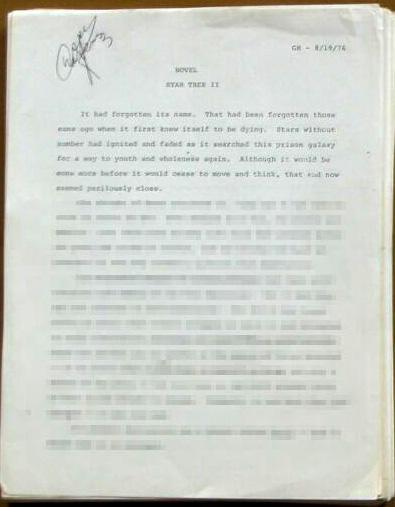
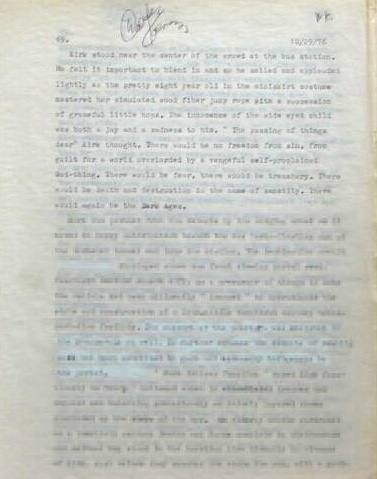
Based on the information and the samples, in addition to all the
information gathered over the years, it looks very much like publication
of the manuscript would be something of an anticlimax, given the
similarities to The Motion Picture and Roddenberry's
lack of experience writing prose fiction. That doesn't mean I wouldn't
love to have a copy, whether just a photocopy or an edited and revised
published version.
In conclusion
Part of the process of researching this has been discovering how many people worked on The God Thing
at different times. Gene Roddenberry started it, Walter Koenig worked
on a version of it in the late 1970s, Susan Sackett and Fred Bronson
worked on a version of it in 1991, Michael Jan Friedman was working on
it in 1992, David Alexander was working on it in 1994. The flipside is
learning that some of the writers did less work on the project than I
originally believed. There is, apparently, no unpublished manuscript as
completed by either Michael Jan Friedman or Susan Sackett and Fred
Bronson. No doubt they put a lot of thought and time into the project,
but apparently neither progressed far beyond the outlining stage.
I've tried contacting Walter Koenig and Rod Roddenberry through
their websites. No replies so far. I suspect Koenig still has a copy of
his manuscript; I hope so, anyway, as it seems to be the most complete
version in existence.
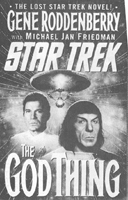
Colour cover scan provided by Jim McCain in 2004.
My thanks to Jim, as well as to Dustin Kolan, who provided the black and
white image above, which headed this page for well over a year. It was
an ad for the audiobook version of The God Thing from a 1992 Starland catalogue. I corrected the angle and cropped it. The audio cover includes the phrase "The Lost Star Trek Novel." It also omits the hyphen that appears on the book jacket. Personally, I think I'll keep calling it The God Thing rather than The God-Thing. If it's ever published either way, I may change my mind...
All quoted material above is copyrighted by the
respective authors or by CBS or Paramount Pictures. Book covers are
copyrighted by CBS, Paramount Pictures, the artists, or the respective
publishers. Please note that I cannot guarantee the veracity of the quoted material.
Thanks to Alan Ravitch, Bob Greenberger, Jim
McCain, Dustin Kolan, Michael Jan Friedman, John Ordover, David
Alexander, Leif Whitmore, Susan Sackett, the Anonymous Collector, the
authors of the materials cited and quoted, and anyone who's read the
page or commented on it.


